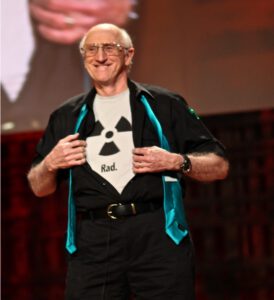
What if a belief you deeply held and one that’s reciprocated by your entire social circle is actually wrong and harmful? In the spirit of my last blog, I want to tell the story of how I changed my mind on a major issue. The position I want to challenge is deeply engrained in the DNA of the mainstream environmental movement, especially here in Germany: the opposition to nuclear power.
Growing up in Altona, being anti-nuclear was as normal as wearing clothes. Anti-nuclear protests were the first ones I attended, and so did every respectable human being I knew. The iconic yellow-sun saying Atomkraft? – Nein, danke! (“Nuclear Energy? No thanks”) was smiling at me from cars, streetlights, and doors. At the yearly Altonale festival, my friends and I were able to have some fun with the voice-changing properties of helium – at the courtesy of political parties advertising their program by handing out balloons. However, that was not the only reason we headed for these tents. We also tried to convince the conservatives to change their position on nuclear energy. By my late teens, I considered the argument settled. Green energy will get us out of that climate mess. The fact that Germany was, and still is, heavily reliant on fossil fuels is due to failed politics. What else? All these wonderful people I loved and cared about were on one side – the right one. They can’t possibly be all wrong, can they?
It wasn’t until my early twenties that my opinions started to change. At one point, I was forced to turn around and see, not the dancing shadows on the wall of the cave, but the world for what it really is. I was confronted with the very real problems of renewable energy. But I’m a solution-driven guy, so I looked at what our options are. And what did I find? Nuclear energy. It was like in some high-school teen movie where the protagonist discovers his true love has been right in front of him the entire time – he just didn’t realize it.
From a concern for climate change, I developed the idea of staying at a sustainable farm for some time. I was convinced that once all our jobs are automated, we can all be farmers – a blessing for the mind and the environment. I went to Sweden to assist a young lad from Scotland who had bought a house and some land to live off. Surrounded by pine trees and meadows so rich in flowers, his plot would make every florist jealous. The only cooking tool capable of dealing with the scarce energy from the solar panel was a slow cooker. Even though I enjoyed every minute of my stay, some part of me anticipated the return to civilization.
I remember coming home and getting very excited just by turning on the stove as long as I wanted to. What I did learn about myself is – while I like being outside – I don’t want to spend my entire energy on cooking food or making sure I have a nice place to live. So how could I demand that of other people? There’s also a gigantic difference between actively choosing to be a subsistence farmer, from a position of wealth and opportunity, and being one just by the virtue of birth. Luckily, I wasn’t the first person to understand that going back to live a low energy life is not an option for most people. Quite to the contrary, energy poverty is a cause of many diseases, whether it’s due to the use of wood as cooking fuel or insufficient cooling of food.
The school of thought, which in my opinion best navigates the problems of global poverty and climate change, is ecomodernism. It originated on the West Coast of the U.S. The idea is to minimize human impact to the earth by limiting the CO2 output and the space needed for human activities while having a prosperous economy, aimed at getting people out of poverty. Nuclear energy is essential to that process because, unlike fossil fuels, it produces much less carbon dioxide.
Now you might be thinking, alright so we get all that energy, but what good is it if we’re then poisoned by radiation? How does it compare to all other sources of energy, and is the fear of low-level radiation justified? I started writing this piece in January. As of March, the issue of energy became more dire than ever. As we’ve since learned, the West has outsourced not only the production of energy products, such as gas and oil to other countries, but also the production of essential energy intense products such as fertilizer to, in particular, China and Russia.
Fighting climate change is not an easy task. Fortunately, the vast majority of people recognize the necessity to start doing it. It will entail an honest conversation on the risks and benefits of producing energy as well as fundamental questions on what kind of society we want to live in. For me, instead of having potential power shortages, I ask everyone to reconsider their view on nuclear energy.
2,216 Total Views, 10 Views Today






